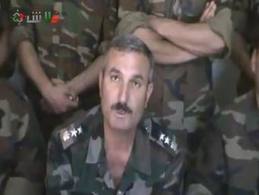 Syria’s main rebel group says it is moving its command centre from the Turkish border into Syria itself in preparation of an offensive against President Bashar al-Assad’s troops in Damascus.
Syria’s main rebel group says it is moving its command centre from the Turkish border into Syria itself in preparation of an offensive against President Bashar al-Assad’s troops in Damascus.
Riyad al-Asaad, commander of the Free Syrian Army (FSA), announced the move on Saturday in a video message from Syria, the first since the group founded its command centre in Turkey at the beginning of the 19-month conflict.
“To the Syrian people, its freedom fighters and all the armed factions, we are glad to let you know that the leadership of the FSA has moved into Syria following arrangements made with other brigades that included securing liberated areas with the hope of launching the offensive on Damascus,” Asaad said.
He said the FSA has felt pressure by the international community to take a leading role in post-war Syria. Asaad said the FSA rejected those offers, reiterating that the people of Syria should decide the future of the country.
“Since we left our country we suffered all sorts of regional and international interference and political pressure, we were isolated. Their goal was to have the FSA replace Assad once he is gone, but we categorically made it clear that we would never betray our people reiterating that only the Syrians should decide their future institutions.”
Al Jazeera’s Andrew Simmons, reporting from Akcakale on the Turkey-Syria border, said the rebels have been cautiously edging forward, taking territory 5km inside Syria.
“The move of the command centre is not necessarily a massive breakthrough because the FSA is still very much dependent on Turkey for its supply lines,” he said.
‘Border clashes’
In Saturday’s other developments, Syrian government troops and rebels clashed near a border crossing with Jordan, opposition activists said.
The fighting, accompanied by heavy shelling from government troops, raged on Saturday near the busy Al-Nasib border crossing located on a highway linking the Syrian and Jordanian capitals, according to the activists.
Egyptian Middle East News Agency (MENA) quoted a high-ranking Jordanian official as denying the reports about clashes between Jordanian and Syrian armies.
The official confirmed that Jordanian soldiers shot in the air to distract the Syrian soldiers from chasing refugees during their attempts to cross the border.
Meanwhile, a witness told Reuters news agency that rebel fighters shot down a fighter jet as it flew over the northern town of Atarib in Idlib province.
The witness, an independent journalist who asked to remain anonymous, said rebel fighters were attacking a military base near the town when the jet flew over and rebels shot it down with anti-aircraft guns.
Vastly outgunned, rebels say they need surface-to-air missiles to take down fighter jets and helicopters used by the Syrian military to bombard opposition strongholds.
Anti-aircraft guns
Fighters use outdated anti-aircraft machine guns that are welded to pickup vehicles but they are inaccurate and useless if the military aircraft fly above a certain altitude.
On August 27 fighters shot down a helicopter on the outskirts of Damascus and three days later rebels said they had brought down a jet in Idlib, near the Turkish border.
Elsewhere in Syria, activists said government jets bombarded areas in Yabroud, near the capital Damascus, and pro-rebel districts in the embattled northern city of Aleppo.
Independent verification of reports out of Syria is constrained by media restrictions imposed by the government in Damascus.
At least 150 people, mainly near Damascus and Aleppo, were killed across Syria on Friday, the opposition Syrian Observatory for Human Rights reported.
Also on Friday, Iraq has barred a North Korean aircraft from using its airspace on suspicion it was carrying weapons for Syria, regional media reported.
Earlier this week, US officials accused Iraq of allowing Iran to fly arms to Syria using the Iraqi airspace, a charge denied by the Baghdad government. North Korea and Iran are allies of Assad.
Activists say more than 27,000 people, mostly civilians, have been killed in the uprising in Syria, which began with peaceful street protests that provoked a military crackdown and mushroomed into civil war.
Despite calling for Assad to step down, the West is wary of arming disparate rebel groups.
Al Jazeera

Leave a Reply
You must be logged in to post a comment.